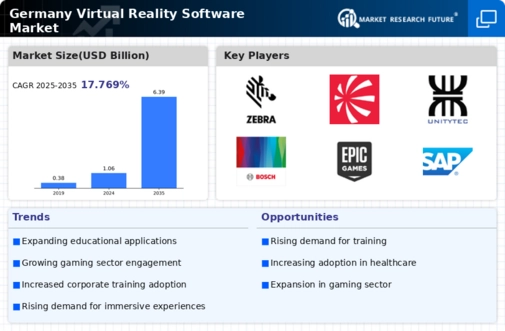Supportive Government Initiatives
The German government has implemented various initiatives to foster the growth of the virtual reality software market. Programs aimed at promoting digital innovation and technology adoption are crucial in this context. For instance, the Federal Ministry for Economic Affairs and Energy has allocated funding to support research and development in VR technologies. Additionally, partnerships between government entities and private companies are being encouraged to facilitate knowledge transfer and commercialization of VR applications. These initiatives not only provide financial support but also create a conducive environment for startups and established firms in the Germany virtual reality software market to thrive and innovate.
Advancements in Hardware Technology
Technological advancements in hardware are significantly influencing the Germany virtual reality software market. The development of more powerful and affordable VR headsets, such as those from leading manufacturers, has made VR more accessible to consumers and businesses alike. Enhanced graphics, improved motion tracking, and wireless capabilities are transforming user experiences, making VR applications more appealing. As hardware continues to evolve, it is expected that the market will expand, with projections indicating a compound annual growth rate of around 30% in the coming years. This growth is likely to stimulate further software development, creating a symbiotic relationship between hardware and software in the Germany virtual reality software market.
Growing Demand for Immersive Experiences
The Germany virtual reality software market is witnessing a growing demand for immersive experiences across various sectors. This trend is particularly evident in entertainment, where consumers increasingly seek engaging content that transcends traditional media. The gaming industry, for instance, has seen a surge in VR titles, with revenues projected to reach approximately 1.5 billion euros by 2026. This demand is not limited to entertainment; sectors such as tourism and real estate are also leveraging VR to provide virtual tours, enhancing customer engagement. As consumers become more accustomed to these experiences, the expectation for high-quality VR content continues to rise, driving innovation and investment in the Germany virtual reality software market.
Integration of VR in Training and Simulation
The integration of virtual reality in training and simulation applications is a key driver for the Germany virtual reality software market. Industries such as automotive, aviation, and manufacturing are increasingly adopting VR for employee training, allowing for safe and cost-effective simulations of real-world scenarios. This approach not only enhances learning outcomes but also reduces training costs significantly. For example, companies are utilizing VR to simulate complex machinery operations, which can lead to improved safety and efficiency. As more organizations recognize the benefits of VR training solutions, the demand for specialized software in the Germany virtual reality software market is expected to rise.
Rising Interest in Virtual Events and Experiences
The rising interest in virtual events and experiences is reshaping the landscape of the Germany virtual reality software market. As organizations seek innovative ways to engage audiences, virtual reality offers unique opportunities for hosting events, conferences, and exhibitions. This trend is particularly relevant in the context of hybrid events, where VR can enhance participant interaction and engagement. Market data suggests that the virtual events sector is projected to grow significantly, with many companies investing in VR platforms to create immersive experiences. This shift not only opens new revenue streams but also encourages the development of tailored VR solutions within the Germany virtual reality software market.




















